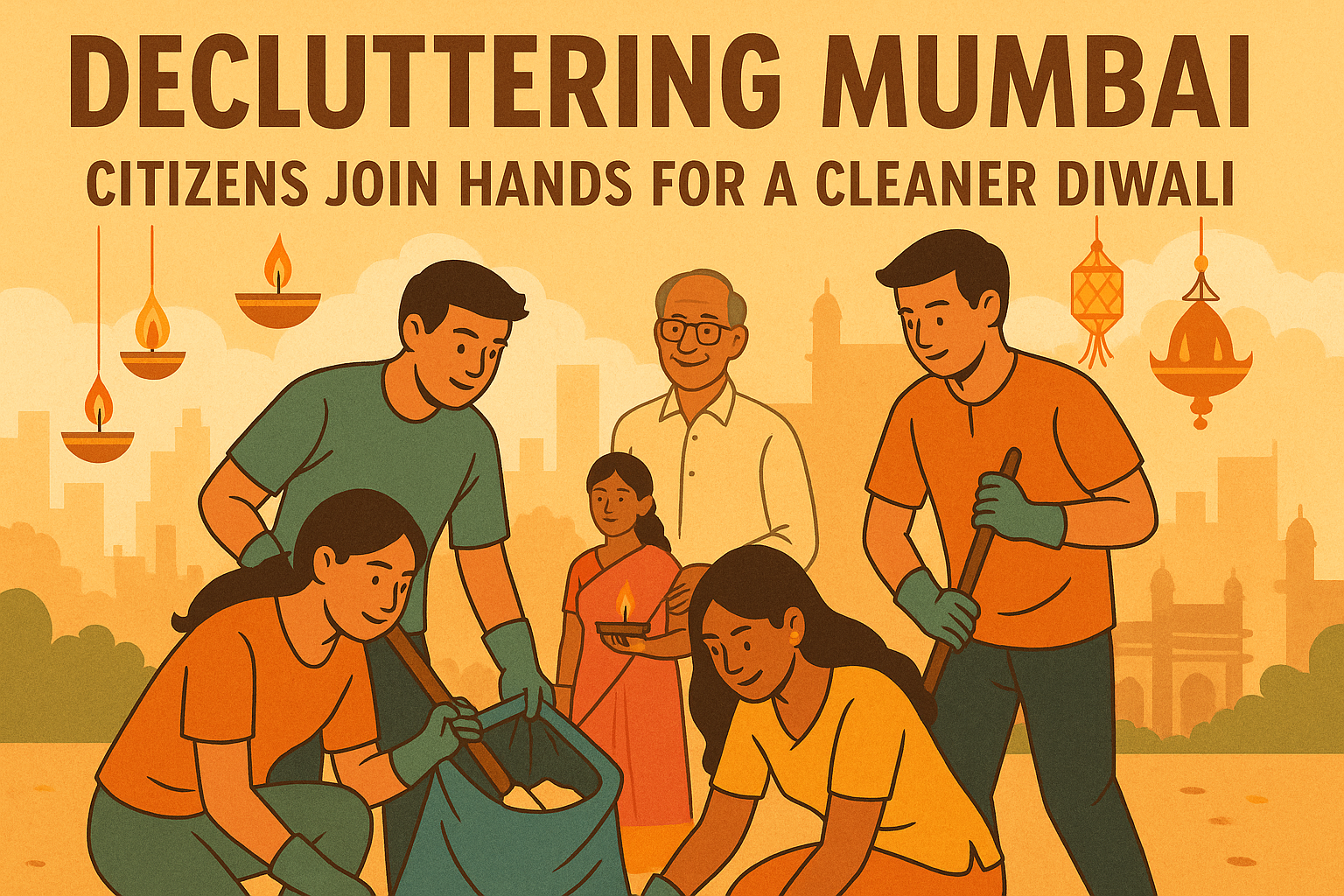
Decluttering Mumbai: Citizens Join Hands for a Cleaner Diwali
As Diwali approaches, households across Mumbai and Navi Mumbai are preparing for their annual ritual of cleaning out cupboards, drawers, and shelves. This year, residents have a special opportunity to turn their festive decluttering into an act of environmental responsibility. ReCircle, a city-based waste management company, has launched a 10-day dry waste cleanup drive from October 4 to 14, encouraging citizens to dispose of unused items responsibly.
A Citywide Movement
ReCircle’s campaign covers vast parts of Mumbai and Navi Mumbai, including areas along the Western, Central, and Harbour Railway lines. Nearly 30 volunteers, supported by mini trucks, will traverse neighborhoods to collect dry waste directly from homes, schools, offices, and housing societies. Each truck is accompanied by a volunteer trained to log collections and coordinate with citizen groups, ensuring efficient last-mile connectivity.
The initiative, free of cost, accepts paper, plastics, cans, glass jars, textiles, footwear, and e-waste. However, organizers request residents to avoid donating torn clothes, sharp objects, food waste, or chemicals to ensure volunteer safety. Citizens can register through the group’s official portal and book a pickup slot.
Since its inception in 2021, ReCircle has collected nearly 75,000 kilograms of dry waste, which includes paper, plastics, old textiles, metals, and electronic waste. The organization’s brand advisor, Nikki Gupta, emphasizes that while the logistics are demanding, community support has made the project successful year after year.
From Homes to Recovery Facilities
The collected waste is taken to a material recovery facility in Malad, where around 20 “safaai saathis” (sanitation workers) sort the materials on a semi-automatic factory line. Items are then sent to third-party recyclers for processing.
Over the years, the team has received unusual submissions ranging from unused gym kits and clothing with price tags intact to even pieces of jewelry. Some items, like stuffed toys in good condition, are given to the children of the safaai saathis, adding a heartwarming layer to the campaign.
This year, ReCircle has also pledged to donate all monetary proceeds from the sale of collected materials to the St. Catherine of Siena School and Orphanage in Bandra West, spreading festive cheer to underprivileged children.
Tackling Hoarding Habits
Despite its success, the biggest challenge for ReCircle remains the reluctance of households to let go of possessions. “Most homes have recyclable materials like paper, toys, and plastic that simply sit unused. Hoarding isn’t the solution,” Gupta explains.
Psychologists warn that excessive hoarding may not always be about sentimentality or laziness. Dr. Meghna Singhal, a practicing psychologist, notes that Compulsive Hoarding Disorder is a recognized mental health condition linked to irrational fears and irregular brain activity. “Families must be supportive and seek professional help if they see signs of compulsive hoarding. It requires empathy, not judgment,” she adds.
Beyond ReCircle: Other Green Options
For those unable to register with ReCircle, several community-driven initiatives across Mumbai are offering alternative ways to dispose of waste responsibly:
- Dhyas Foundation (Vasai): Collects household waste and operates a utensil bank to reduce the use of disposable cutlery at gatherings.
- Turn Around Shop (Gamdevi): Accepts donations of pre-loved clothes and shoes, while also offering sustainable gifting options for Diwali shoppers.
- 5RCycle: Conducts interactive awareness sessions at community events and Diwali parties, teaching participants about recycling and sustainable living.
These initiatives collectively highlight the growing culture of environment-conscious celebrations in Mumbai.
Lighting Up Lives, Not Landfills
This year’s decluttering drive is more than just a clean-up exercise. By transforming discarded items into resources and donations, Mumbaikars have a chance to contribute to both the environment and society. The initiative represents a shift in festive traditions—from mere cleaning to conscious giving.
As families sweep through their cupboards and attics, the campaign serves as a reminder that every old newspaper, plastic container, or unused gadget can find a better purpose. By working together, citizens are not only creating cleaner homes but also helping shape a more sustainable city.
This Diwali, the message is clear: decluttering is not about throwing away—it’s about giving responsibly, recycling thoughtfully, and lighting up lives beyond our own.





